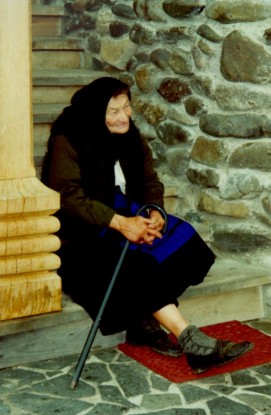| Persecution
and suppression of Christianity by the Soviet regime. |
 |
|
Often
it was the older women who kept
churches alive in the Soviet Union
|
The Soviet Union
took severe measures to destroy Russian Orthodoxy, which had been Russia's
official church, and smaller Protestant and Catholic groups. In 1918,
the year Aleksandr Solzhenitsyn
was born, Soviets seized most of the lands owned by the Orthodox church.
Monasteries were destroyed and monks were evicted. Soon churches were
forbidden to own property. Persecution
continued in 1929 as more laws outlawed religious education, taxed church
personnel, restrained charitable work, and forbade all forms of religious
"propaganda." Many religious leaders were killed or sent to labor camps;
churches were vandalized, destroyed, or used as office buildings, barns,
or storage dumps. At the height of Soviet power, hundreds of thousands
became religious martyrs,
most of them Christians but also Muslims and others. As the decades of
Soviet rule passed, many Christians were sent to psychiatric hospitals
because religion was categorized as mental illness. Others were denied
access to education and desirable jobs. Where churches were allowed to
exist, they lived in servitude to the Soviets. In many places, the church
was kept alive by old women.
|